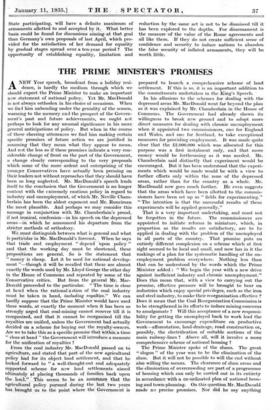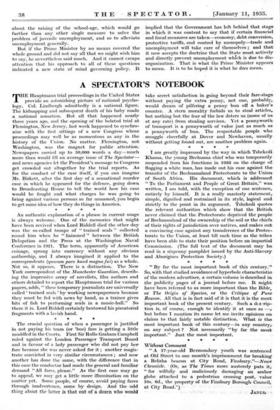THE PRIME MINISTER'S PROMISES
ANEW Year speech, broadcast from a holiday resi- dence, is hardly the medium through which we should expect the Prime Minister to make an important new statement of national policy. Yet Mr. MacDonald is not always orthodox in his choice of occasions. When we find him unbending under the geniality of the season, warming to the memory and the prospect of the Govern- ment's past and future achievements, we ought not perhaps to look for any unusual significance in his more general anticipations of policy. But when in the course of these cheering utterances we find hint making certain specific promises of future action we are justified in assuming that they mean what they appear to mean. And not the less so if these promises indicate a very con- siderable change of front on the part of the Government, a change closely corresponding to the very proposals which some of the more ardent and enterprising of the younger., Conservatives have actually been pressing on their leaders not without reproaches that they should have been so long neglected. Mr. MacDonald's speech lends itself to the conclusion that the Government is no longer content with the extremely cautious policy in regard to industry and unemployMent, of which Mr. Neville Cham- berlain has been the ablest exponent and Mr. Runciman the most plausible. And perhaps we may consider this message in conjunction with Mr. Chamberlain's proud, if not ironical, confession—in his speech on the depressed areas—in which he announced his departure from the stricter methods of orthodoxy.
We must distinguish between what is general and what is partictlar in Mr. MacDonald's forecast. When he says that trade and employment " depend Aipcin policy " and that the working day must be shortened, these propoSitions are general. So is the statement that " money is cheap. Let it be used for national develop- ment "—though it will be recalled that these are almost exactly the words used by Mr. Lloyd George the other day in the House of Commons and repeated, by some of the Conservative critics. But from the general Mr. Mac- Donald_prOceetled to the particular. " The time is close at hand when the rationalz ition of the coal industry must be taken in hand, including royalties." We can hardly- suppose that the Prime Minister would have used these words, at exactly the moment when it has been so strongly urged that coal-mining cannot recover till it is reorganized, and that it cannot be reorganized till the royalties are unified, unless the Government had actually decided on a scheme for buying out the royalty-owners. Are we to take this as a specific promise that within :a time " close at hand " the GOvernment will introdnce a measure for the unification of royalties ? krom the coal industry Mr. MacDonald passed on to agriculture, and stated that part of the new agricultural Policy had for its object land settlement, and that he looked forward to " a well-thought-out and adequately supported scheme for new land settlements aimed ultimately at placing thousands of families back upon the land." This seems to be an assurance that the agricultural policy pursued during the last two years has brought us to the point where the GOvernment is prepared to launch a comprehensive scheme of land settlement. If this is so, it is an important addition to the commitments undertaken in the King's Speech.
In his allusions to the schemes for dealing with the depressed areas Mr. MacDonald went far beyond the plan as it was explained by Mr. Chamberlain in the House of Commons. The Government had already shown its willingness to break new ground and to adopt more direct measures for dealing with chronic unemployment when it appointed two commissioners, one for England and Wales, and one for Scotland, to take exceptional measures for providing employment. It was made quite clear that the £2,000,000 which was allocated for this purpose was a first instalment only, and that more money would be forthcoming as it was needed. Mr. Chamberlain said distinctly that experiment would be encouraged. But it has been understood that the experi- ments which would be made would be with a view to further efforts only within the zone of the depressed areas, rather than for the country as a whole. Mr. MacDonald now goes much further. He even suggests that the areas which have been allotted to the commis- sioners have been set up as " fields for experimenting." " The intention is that the successful results of these experiments will be applied generally."
That is a very important undertaking, and must not be forgotten in the future. The commissioners are appointed to initiate reforms in miniature, which, in proportion as the results are satisfactory, are to be applied in dealing with the problem of the unemployed in all parts of the country. That promise puts an entirely different complexion on a scheme which at first sight seemed to be local and small, and now has in it the makings of a plan for the systematic handling of the un- employment problem everywhere. Nothing less than that can be understood by the words which the Prime Minister added : " We begin the year with a new drive against inefficient industry and chronic unemployment." Does this mean that, with a view to carrying out the promise, effective pressure will be brought to bear on industries which enjoy special privileges, such as the iron and steel industry, to make their reorganization effective ? Does it mean that the Coal Reorganization Commission is to be strengthened in its efforts to induce mining concerns to amalgamate ? Will this acceptance of a new responsi- bility for getting the unemployed back to work lead the Government to encourage expenditure on productive work—afforestation, land-drainage, road construction or, possibly, the electrification of suitable sections of the main railway-lines ? Above all, will it involve a more comprehensive scheme of national housing ?
The Prime Minister spoke of the slums. The great "slogan " of the year was to be the elimination of the slum. But it will not be possible to will the end without also willing the means. The clearance of slum areas and the elimination of overcrowding are part of a programme of housing which can only be carried out in its entirety in accordance with a co-ordinated plan of national hous- ing and town-planning. On this question Mr. MacDonald made no precise promises. Nor did he say anything about the raising of the school-age, which would go further than any other single measure to solve the problem of juvenile unemployment, and so to alleviate unemployment generally. But if the Prime Minister by no means covered the whole ground and did not say all that we might wish him to say, he nevertheless said much. And it cannot escape attention that his approach to all of these questions indicated a new state , of mind governing policy. It implied that the Government has left behind that stage in which it was content to say that if certain financial and fiscal measures are taken—economy, debt conversion, protective tariffs, and control by monopoly—trade and unemployment will take care of themselves ; and that it now accepts the doctrine that the State must actively and directly prevent unemployment which is due to dis-, organization. That is what the Prime Minister appears to mean. It is to be hoped it is what he does mean.







































 Previous page
Previous page